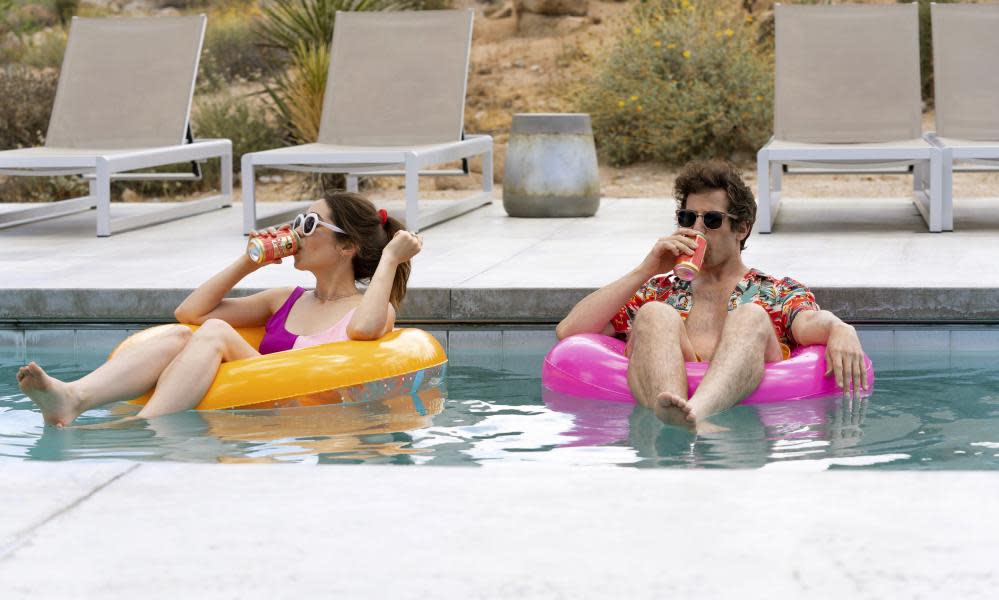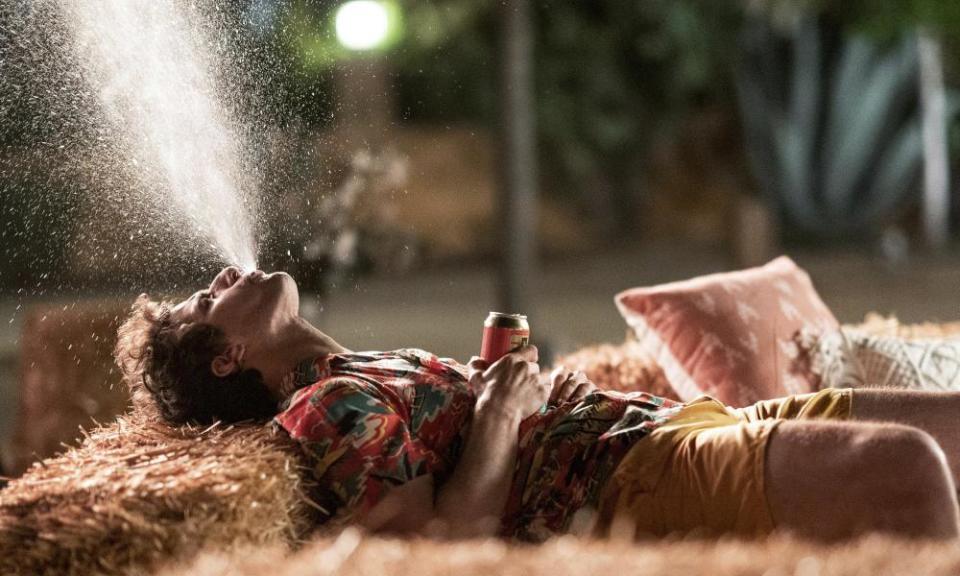Palm Springs review – goofy time-loop romcom recycles reckless pleasures

Throughout this confounding and unsettling time, trapped indoors as a deadly pandemic rages, many of us have found ourselves compulsively and eerily gorging on films that confront the practicalities and horrors involved with some sort of now all-too-familiar apocalypse. Not just those that suddenly seem timely, like viral thriller turned convincing docudrama Contagion, but also those that cover similar global panic and ultimately togetherness in the face of natural disasters, alien invasion and other earth-shaking events. What’s happening outside has made the fantastical stories playing out inside seem that much closer, that much easier to identify with, a world of Hollywood make-believe blurring into real life.
Related: Desperados review – hit-and-miss Netflix comedy offers throwaway summer fun
But paradoxically, it’s also made the simple, more grounded pleasures of movie romance seem almost otherworldly in comparison. Not just the logistics of it (watching two strangers make out without Plexiglass protection between them made me wince in the first few months) but also the carefree, all-consuming joy of it, as if brushing off the many stresses of the world entirely for a quippy meet-cute would be in any way possible this year. Romantic comedies have suddenly felt like curio relics, something they had admittedly felt like for a while to many, a dusty, maligned genre that’s been mostly relegated to Netflix in recent years. But pre-pandemic, about two months before we locked our doors, Sundance history was made when Neon and Hulu partnered to buy Palm Springs, a buzzy hipster wedding romcom with a twist, paying an alleged $22m, a record sale for the festival. The staggering price tag, the talk of the town back in January, was reflective of a reawakened digital fanbase for the genre and one that was coughed up by a savvy streamer aware of the eyeballs it would automatically reach online.
There was something else though: that aforementioned twist. It’s what helped distinguish the film back at Sundance (I doubt that lofty amount would have been coughed up otherwise) and unintentionally, upon release six months later, makes it the odd romantic comedy that feels oddly of the moment, its supernatural quirks normalising the surreal sight of two people flirting and kissing without wearing masks.
The set-up is roughly familiar: two unconnected guests at a wedding find love. Sarah (Cristin Milioti) is the sister of the bride, a cynic who drinks and fucks too much (something she admits to with a combination of pride and shame) while Nyles (Andy Samberg) is a drifter so bored of the festivities that he’s making a drunken scene just to liven things up. By the end of the night they’re undressing under the stars, but events take a shocking turn when Nyles is killed, revealing a Groundhog Day-esque time-loop that Sarah is now trapped in with him. Every day starts the same but how it ends is up to them.
The wake up, flirt, drink, die, repeat formula is a spin on a gimmick that’s become less novel over time (the last few years have seen an uptick with Russian Doll and the Happy Death Day films utilising the structure) but writer Andy Siara is armed with an awareness of this and his inventive addition to the subgenre provides some nifty tweaks. When we meet Samberg’s character, he’s already been stuck in the loop for an unknowable amount of time, alone and bored, having exhausted most of his options (including having sex with one of the groomsmen, revealed with refreshing candor) and in among the goofball antics, there’s a darkness to his predicament, with a few scattered lines and one particularly creepy moment of dishonesty hinting at what Palm Springs, the thriller, would have looked like.

But things are kept mostly lighthearted, first-time director Max Barbakow preferring silliness over anything too salty, and it’s in the initial stages of the pair indulging in reckless, cartoonish fun together that the film truly flies (including quite literally in an amusing plane-based misadventure). Milioti and Samberg are a well-matched duo of disillusioned heavy drinkers, sparking up a spiky screwball chemistry that inevitably softens and as it does, there’s time for deeper, deft discussions about the limitations of love and the importance of knowing and accepting someone’s past.
But as quantum physics enters the frame and as Siara starts scrambling together a frantic finale, the plot starts to feel a little too scrappy, and even at a tidy 90 minutes, the film starts to lose our investment. The sharpness begins to dull, and the laughs slowly fade, but so much good favour is stored up by the zippy, witty pleasures of the first two acts that it’s partly forgiven.
It’s also the specific strangeness of the world they inhabit (although arguably the strangest thing about it is that neither of them once references Harold Ramis’s defining time-loop comedy) that makes Palm Springs feel less throwaway, more notable at this current moment and easier to believe in within the genre. While much of it might drift from one’s memory post-credits, repetition has become such a pronounced part of our lives right now that the vicarious satisfaction we get from watching two people turn their restriction into entertainment sticks. It’s a goofy, drunken scrap of escapism and while the romantic comedy is not fully back, despite think pieces assuring us that it is, Palm Springs energetically reminds us, yet again, that it’s never really going away.
Palm Springs is out on Hulu in the US from 10 July with a UK date yet to be announced

 Yahoo Movies
Yahoo Movies 
